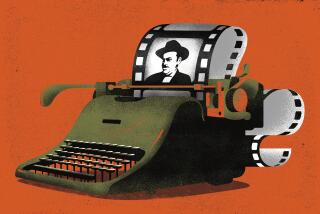Between the Lines That Raised ‘Kane’
- Share via
FADE IN
A VAST GATEWAY OF GRILLED IRON
(In the middle of which is clearly seen a huge initial “K”) stretching clear across the road. As the CAMERA MOVES toward it, the gate opens and the CAMERA PASSES through. A few feet further on, the gate having closed behind it, the CAMERA REVEALS, either because it has reached the top of a small incline or because it has turned a bend, (depending upon the topography to be selected)
THE LITERALLY INCREDIBLE DOMAIN
Of Charles Foster Kane . . .
Thus begins the first rough draft of a florid, achingly long (325 pages) screenplay authored in April, 1940, by an alcoholic ex-newspaperman named Herman J. Mankiewicz. It was written in 12 weeks at a ranch near Victorville and titled simply “American.”
By today’s studio standards, it never would have made it past the first film-school-educated, high-concept reader at Creative Artists Agency, International Creative Management or William Morris. Besides being too long, “American” is replete with such flowery descriptions as “the greens are straggly and overgrown, the fairways wild with tropical weeds” and “a great baronial hallway, completely furnished but empty, silent, abandoned, unreal, fairylike. . . .”
What is worse, the first word of dialogue isn’t spoken until the third page, and all it amounts to is a single word:
Rosebud.
Of course, “American” was chopped to 156 pages and smoothed and, by the following year, became “Citizen Kane.” Today, the film is usually at the top of every critic’s list of the best motion pictures ever made.
Next week, a leather-bound copy of the rough draft and the final shooting script of “Citizen Kane” will be auctioned along with a boxload of other scripts and letters authored by or sent to the late screenwriter. Bid range: $70,000 to $90,000.
Beyond its esoteric and historical value, Mankiewicz’s personal volume of his “Kane” scripts often raises some troubling questions:
Why are 58 pages missing from the middle of “American”? (The script jumps from page 212 to 271 and bears the notation “see other copies for missing pages.”)
Why do typists’ initials change virtually every 10 to 15 pages, indicating that as many as a half-dozen people typed the rough draft? (Mankiewicz supposedly locked himself away at the Campbell Ranch near Victorville with only a nurse and John Houseman to watch over him while he dictated the script.)
And, perhaps most important of all, why didn’t William Randolph Hearst--long recognized as the thinly disguised publishing magnate Charles Foster Kane--stop “Citizen Kane” before it began?
Mankiewicz had proudly turned over his copy of the shooting script to a friend who, as it turned out, was nephew to Marion Davies, Hearst’s longtime mistress. Davies turned the script over to Hearst’s attorneys, who scribbled notes throughout, questioning just how closely Kane’s character approximated Hearst’s.
By the time the script finally came back into Mankiewicz’s possession, the marginalia on several pages included angry attorneys’ notations such as:
“This happens to be the gist of an authentic interview with W.R.H.” and “Midget in Morgan’s lap which W.R. forbade his papers to use.”
(The latter notation referred to an early scene in the movie, when Walter P. Thatcher (J.P. Morgan) has Kane’s (Hearst’s) baby alligator laid in his lap during a congressional hearing.)
But the memorabilia doesn’t end with “Kane.” Mankiewicz’s sons have also offered several congratulatory letters from the Hollywood hoi polloi, sent to their father on the short-lived, successful premiere of “Citizen Kane.” Within weeks, Hearst’s string of powerful daily newspapers helped chill the movie’s reception and his influence on the Hollywood studio system nearly killed the movie at birth.
Christie’s publicist Bethe Goldberg and auctioneer Eric Alberta have high hopes that a particular bidder will make the winning offer on the scripts.
“Steven Spielberg owns Rosebud, the sled used in the movie,” said Goldberg. “We’re hoping he wants it. They belong together.”
More to Read
Only good movies
Get the Indie Focus newsletter, Mark Olsen's weekly guide to the world of cinema.
You may occasionally receive promotional content from the Los Angeles Times.










